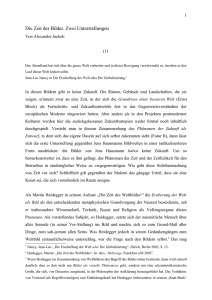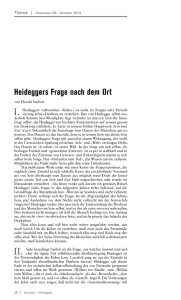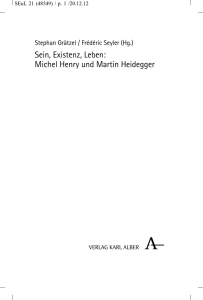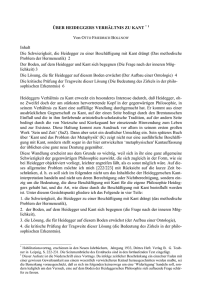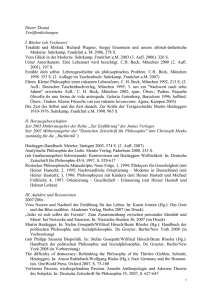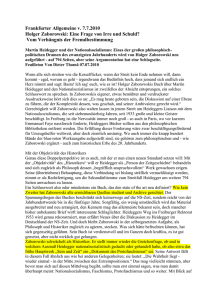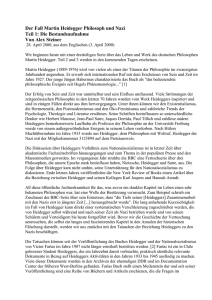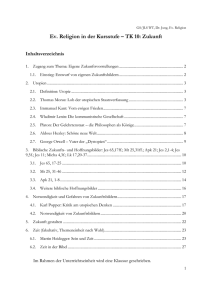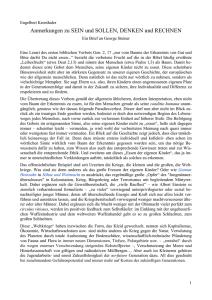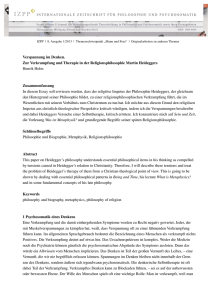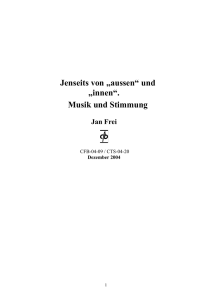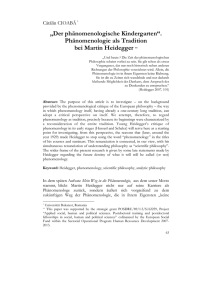Raivis Bičevskis. Truth and facticity. Martin Heidegger`s early
Werbung
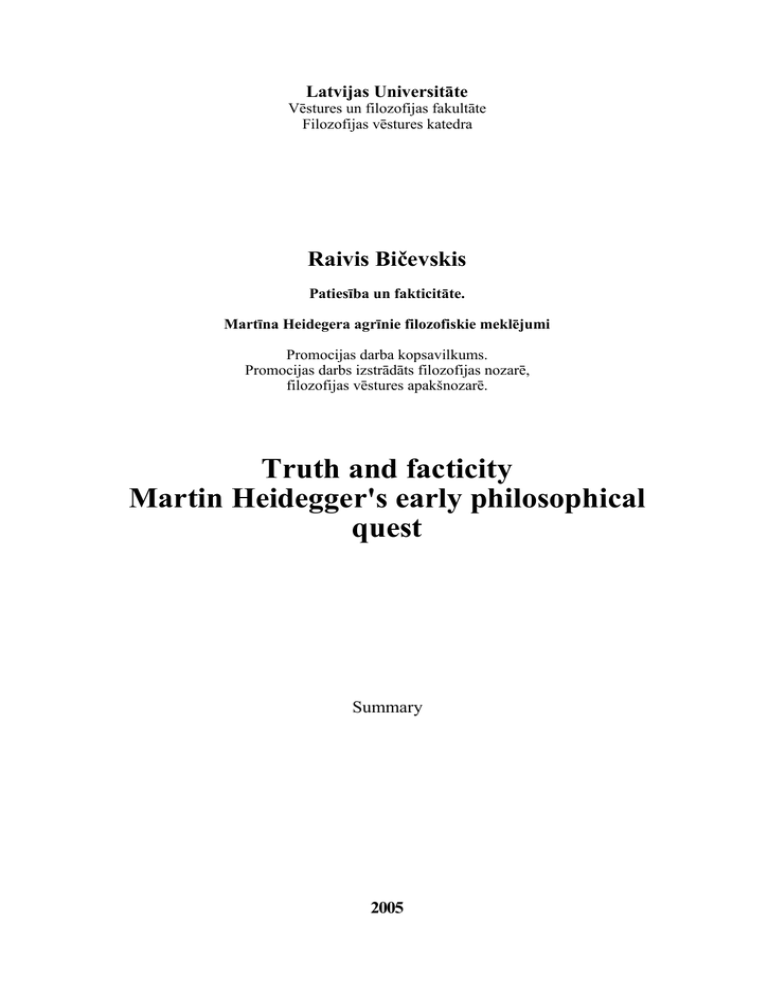
Latvijas Universitāte Vēstures un filozofijas fakultāte Filozofijas vēstures katedra Raivis Bičevskis Patiesība un fakticitāte. Martīna Heidegera agrīnie filozofiskie meklējumi Promocijas darba kopsavilkums. Promocijas darbs izstrādāts filozofijas nozarē, filozofijas vēstures apakšnozarē. Truth and facticity Martin Heidegger's early philosophical quest Summary 2005 Truth and facticity Martin Heidegger's early philosophical quest, 1909-1923 Summary I Theme of the work I 1. The place and significance of the work in the contemporary philosophy Reflections of German philosopher Martin Heidegger (1889-1976) have left the lasting imprint upon vision of history of the European thought and European future within contemporary philosophy, theology and other realms of sciences. Hedegger emphasized that the central question of his philosophical quest was the question on being. The words included in the title of the promotion work "Truth and facticity" designate basic problems Heidegger mostly paid attention to in his early approaching the question on being. This approaching and the most significant milestones are in the center of attention of the promotion work. The results of the long way of the formation of understanding the strivings and preconditions of underststanding the German thinker at the turn of the 20th/21st centuries demonstrate that the question on being indeed form the essential point that unites Hedegger's reflections on different stages of his philosophical quest. However, it should be noted that this question in Hedegger's relentless quest in within time period of several decades has its own history. Understanding of the central question of Martin Hedegger's reflections largely depends on understanding of history and its appropriate evaluation. It becomes more and more evident that Heidegger's way, his quest, the historical constellation of problems, and complexity of the fate of metaphysical tradition most essentially pertain the question put forward by the German philosopher. This opinion prompts the view that the history of Heidegger's question on being is not only the history of creation of his large format work of the 20-ies "Being and Time" (1927). It should be clearly understood that it is the whole history of intention to ask the question on being and time. Thus the early Martin Heidegger's first independent steps in research, the beginning of the way of the German thinker regain their significance.77 It should be admitted that disclosing this beginning we are talking not only about singular, though prominent thinker's philosophical quest. Reflections on the early period of M. Hedegger's philosophy show that it is impossible without deep analysis of the European philosophical trends of the turn of the 19th/20th centuries and of the first half of the 20 century. Taking into account Hedegger's level of the problem perception, it has to be said that the disclosure of beginning is impossible without reflections upon the historical fate of the European philosophically theological tradition, metaphysics, ontology and gnoseology. Only grasping the indeed unique vision arising in the German philosopher's quest within long-term historical context, it will be possible to ask what new accents (comparing with the historical tradition) could be found in his heritage. Questions posed in Martin Heidegger's philosophy already in its early period, hasnt still lost their actuality. It should be admitted that the way the German philosopher's thought thematizes actual philosophical problems of the first half of the 20 century (meaning, truth, knowing, transcendental philosophy, ontology, and others) appears to be very fruitful because it voices the long tradition of the European metaphysics. This kind of approach regards philosophy and theology as a whole, and it opens up the possibility to disclose the determinative basic features of the European thought and life forms. Hence the reflection upon the early Heidegger's philosophy is not task only for the history of 76 The generally adopted division in interpretations of M. Heidegger's philosophical quest ("young Heidegger" - till 1919; "early Heidegger" - from 1919 till 1929; "late Heidegger" - the 30-ies, 40-ies and the beginning of the 50-ies; "old Heidegger" - from the of the 50-ies till his death in 1976) is not always observed consistently. Compare Theodore Kisiel, The Genesis of Heidegger's Being and Time. Berkley/London, 1993. P. XIII. John van Buren, The Young Heidegger. Rumor of the Hidden King. Bloomington/Indianapolis, 1994. P. 3-27. Georg Imdahl, Das Leben verstehen. Heideggers formal anzeigende Hermeneutik in den fruhen Freiburger Vorlesungen. Wurzburg, 1997. S. 13 ff. The denotation "early Heidegger" used in the dissertation pertains to the time from the first Heidegger's articles till the end of his first Freiburg period (1929) - the period that can be clearly separated from the further phases in development of the German thinker's reflections. This division is not systematic in its nature - the task of the promotion work is to show specifically the continuity of Heidegger's quest. The question is rather about the time of his maturation, to be followed by further development of his views. The designation "early Freiburg lectures" pertains to Heeidegger's lectures in Freiburg (1928-1944). The "Marburg lectures" cover the time period from 1923 till 1928. 77 At present in Germany there are several comprehensive Heidegger's research projects "Heidegger and Christianity", "Heidegger and Medieval Scholastics", Heidegger and Nietzsche", "Heidegger's interpretation of the history of being and the history of philosophy", and others that analyze early Heidegger's views within broad context of the European culture. philosophy, but the urgent and actual task for the philosophical comprehension of the contemporary European thinking, existential possibilities and future perspectives. In the beginning of the 21st century there is possibility to form the foreseeable, historically and systematically justified vision of early Heidegger's works. In the philosophical literature of Western Europe devoted to Heidegger's philosophy interpretations enough work has been done to gather and evaluate testimonies necessary for this kind of approach. Within collection of Heidegger's works Gesamtausgabe78 in 2000 there were included Heidegger's first articles 79 (see the chapter I B 1 of the promotion work). Another collection of first articles, his dissertation and the habilitation work are known from the edition of Heidegger's "Early Articles" (1974), that presently can be found in the 1st volume of Gesamtausgabe80 (see the chapters I B 1, and I B 2 of the promotion work). Now they can be supplemented by Heidegger's reports in Heinrich Rickert's seminars and by the letters to Rickert81 (see the chapter I B 1 of the promotion work). Also his letters to the medievalist Martin Grabmann, Heidegger's friend and colleague, the catholic priest and theologian Engelbert Krebs82 are testimonies on Heidegger's reflections of this period. A part of early letters (unhappily they are not fully 78 Martin Heidegger, Gesamtausgabe. Ausgabe letzter Hand. Hrsg. von Wilhelm-Friedrich von hermann u.a. Frankfurt am Main: Vittorio Klostermann, 1975 ff. I Abteilung: Veröffentlichte Schriften 1910-1976. II Abteilung: Vorlesungen 1919-1944. III Abteilung: Unveröffentlichte Abhandlungen - Vorträge -Gedachtes. IV Abteilung: Hinweise und Aufzeichnungen. The publishing of Gesamtausgabe was begun while Heidegger was stiil alive (1975). The presently planned 102-volume edition wouldn't be possible without participation of the widw ränge of scholars (see Martin Heidegger Gesamtausgabe. Ausgabe letzter Hand. Veralgsprospekt Vittorio Klostermann Frankfurt am Main. Stand 2003. S. 7-24.) . However, Wilhelm Hermann and Hartmut Tietjen should be especially credited for their work in publishing the heritage left by Heidegger. See HGA I, Bd. 16. Though, the scholars can still find other works in the catholic newspapers and yearbooks of the beginning of the century. However for a long time period out of the field of attention there were left reports on the catholic meetings held Messkirch published in the "Heiberg People Newspaper" in 1910-1913. Heidegger delivered his reports in the meetings. Here it is possible to find (though indirect) additions to Heidegger's first articles and reviews. See Alfred Denker, Herr Studiosus Heidegger un seine Heimatstadt Messkirch. Bausteine zu Heideggers Biographie. Izd.: Messkircher Heimathefte Nr. 7, 2000. 80 See HGA I, Bd. 1. 81 See Martin Heidegger/Heinirch Rickert, Briefe 1912 bis 1933 und andere Dokumente. Aus den Nachlässen herausgegeben von Alfred Denker. Frankfurt am Main, 2002. 82 See Briefan Engelbert Krebs 19. 7. 1914 // Hugo Ott, Martin Heidegger. Unterwegs zu seiner Biographie. S. 83. Brief an Engelbert Krebs 9. 1. 1919. // Bernhard Casper, Martin Heidegger un die Theologische Fakultät Freiburg 1909-1923.Freiburger Diözesan-Archiv 100 (1980). S. 541. Brief an Martin Grabmann // Herman Köstler, Heidegger schreibt an Grabmann. (PhJb 87 (1980)). S. 98-104. In the context of development of the Heidegger's views it is interesting to compare them with his letter to Josef Sauer (1912) (see Brief an Jose Sauer // Hugo Ott, Martin Heidegger. Unterwegs zu seiner Biographie. S. 73-73.) and the later letter to Karl Löwith. Hrsg. von Hartmut Tietjen. Izd.: Zurphilosophichen Aktualität Heideggers. Hrsg. von D. Papenfuss und O. Pöggeler. Bd. 2. Frankfurt am Main, 1990. S. 27-39.). preserved) to the catholic theologians and scholars Heinrich Finke, Josef Sauer, Ernst Laslowski, Engelbert Krebs, and others is published in the 1st volume of the "Heidegger's Yearbook" in the second half of 2004. It seems that Heidegger's lectures of 1916-1917 should be regarded as lost and nonrestorable.83 The most significant documents of the "transition period" (1917-1918) are sketches "Philosophical Grounds of Medieval Mysticism"84 (see the chapter I C 2 of the promotion work), as well as his letter to Edmund Husserl and Elisabeth Blochmann.85 It is followed by the complete collection of the early lectures from 1919-192386 (see the chapters II A 1 - II C 3 of the promotion work). It undoubtedly is the most significant corpus that (supplemented with corrections and amendments, also with letters to Karl Jaspers and the notable review of Jaspers's "Psychologies of the worldviews" (1919/1921)87 (see the chapter II A 2 of the promotion work) gives the broadest insight into early Heidegger's quest. Several texts of this period (lectures of the summer semester of 1922, the article "Notion of Time")88 are waiting to be published. There have been published also - "Report to Nathorp" (1922), "Kasel Lectures" (1925), the lecture "Notion of Time" (1924) 89 (see the chapter II C 3 of the promotion work), Heidegger's paper in Rudolph Bultmann's seminars "Problem of Sin in Luther's understanding" (1924)90 (see the chapters II C 1 - II C 3 of the promotion work). The last works mentioned pertain already to the beginning of the Marburg years, but systematically they belong to the period of the first stage of Freiburg last years. Soon there will be published the volume of Gesamtausgabe with Heidegger's lectures that will include also lectures 83 The list of lectures of these years see Kisiel, Theodore: The Genesis of Heidegger's "Being and Time". London, 1993. P. 461 ff. 84 See HGAII Bd. 60. S. 301-337. 85 Briefwechsel Martin Heidegger/Edmund Husserl // Husserliana. Dokumente. Bd. EI Briefwechsel. Teil VI. Hrsg. von Karl Schuhmann. Dordrecht, 1994. S. 127-161. Briefwechsel Martin Heidegger/Elisabeth Blochmann 1919-1969. Hrsg. von Joachim W. Storck. Marbacham Neckar, 1990. 86 See HGAII, Bd. 56/57. HGAII Bd. 58. HGAII, Bd. 59. HGA II, Bd.60. HGA IL Bd. 61. HGAII, Bd. 63. 87 See HGA I, Bd. 9. S. 1-44. 88 It is to be included in Gesamtausgabe HGA II, Bd. 62. HGA III, Bd. 64. 89 See Phänomenologische Interpretationen zu Aristoteles (Anzeige der hermeneutischen Situation) // Dilthey-Jarbuch 6 (1989). S. 235-274. Wilhelm Diltheys Forschungsarbeit un der gegenwärtige Kampfun eine historische Weltanschauung. Idz.: Dilthey-Jarbuch 8 (1993). S. 143-177. Der Begriff der Zeit. Vortrag vor der Marburger Theologenschaft Juli 1924. Hrsg. von Hartmut Tietjen. Tübingen, 1989. 90 See Das Problem der Sünde bei Luther // Sachgemässe Exegese. Die Protokolle aus Rudolf Bultmanns Neutestamentlichen Seminaren 1921-1951. Hrsg. von Berndt Jasper! Marburg 1996. (Marburger Theologische Studien, Bd. 43). S. 28 ff. from the beginning and middle of the twenties91. There should be added several unknown till now testimonies on the early period that are presently available within Gesamtaugabe92 In the beginning of 2005 when there the article "Notion of Time" will have been published (see the chapter II C 1 of the promotion work), the lectures "Phenomenological Interpretation of Ontological and Logical Tractates Chosen by Aristotle", as well as the first volume of the "Heidegger's Yearbook" devoted to the early Heidegger (it will unite the known ways of interpretation and, supposedly, it will mark the perspectives for future reflections), it will be possible to say that future task in researching early Heidegger's quest will be not historically philological anymore, but rather philosophically systematic work. The most significant later Heidegger's works where he casts a look back to his way of philosophical quest are: Heidegger's speech regarding his acceptance in the Heidelberg Academy of Sciences (1957)93, the retrospection "My Way in Phenomenology" (1963)94 and the work published as late as in 1996 "Retrospect on the Way" (1937/1937) that includes the Heidegger's short manuscript "My Way Until Now"95. Comparing them mutually and comparing them with early retrospections, for example, with curriculum vitae96 of 1915, Vita (1922)97 it is possibly to see the changes in Heidegger's view on his personal way. This moment could be the reason for not always scrupulous following the path laid out by the self-interpretation of the German philosopher. However, the author of the promotion work supports the opinion that there is no reason for premature dismissal of the perspective marked by Heidegger himself. In retrospections nevertheless there are decisive hints that should be taken into account in historically systematic vision of early Hedegger's reflections. 91 See HGAIII, Bd. 80. See HGA I, Bd. 16. 93 See HGA I, Bd. 1. 94 See Zur Sache des Denkens. Tübingen, 1969. 95 See HGA III, Bd. 66. 96 See HGA I, Bd. 16. 97 See HGA I, Bd. 16. 92 I 2. Theme of the work within context of the philosophical thought in Latvia The above mentioned considerations pertain also to the significance and place of the theme of the work within context of Latvia. There should be described philosophers whose thinking have left long lasting impression onto European culture in the 20th century and who still influence the fundamental assumptions of the European culture in the beginning of the 21st century. No doubt, Martin Heidegger is one of the most eminent representatives of the European philosophically theological thought. His conceptuality and philosophical language in general that tries to reflect adequately the complex philosophical problems of the 20th century should be included into Latvian language, thus furthering development of the Latvian philosophical terminology and possibilities of the language. Deep analysis of the formation of Martin Heidegger's views discloses not only the situation of the European philosophical thought in the beginning of the 20th century, but also causes reflection upon the historically long-term transformation of the European thinking that has resulted in the present, the turn of the 20th /21st centuries, situation of the European philosophy and Western culture. Historically long-term transformation of the European thinking pondered in Heidegger's reflections is directly related with the present and future of Latvia. Therefore, the encouragement of understanding of these processes (on different levels of reflection and research) is urgent task for the contemporary philosophy of Latvia. Deep insight into formation of M. Heidegger's philosophy (trying to avoid simplifications and premature conclusions) prepares also the grounds for proper understanding of the German philosopher's later works, the comprehensive vision of problems of the complex 20th -century European philosophy. Thus the work on the qualitative philosophy and its presentation at the university, as well as on the deep understanding of research tasks is being continued. II Structure of the work and conclusions II 1. Layout of the work and content The promotion work consists of introduction, two parts, divided into 13 chapters, conclusion, bibliography and index of personal names. The subsections of the parts (I-II) are divided into the groups, thematically chronological (I A 1 - I A 2,1 B 1 - I B 2, etc.). The first part of the promotion work marks Martin Heidegger's way from his very first steps in philosophical research until beginning of his academic work at the Freiburg University. The second part turns to the Heidegger's lectures during the first Freiburg stage (1919-1923) and the constellation of the German thinker's reflections prior to the end of the first stage of the Freiburg period and arriving in Marburg. The chapter I A 1 briefly describes the propellant motifs of the Heidegger's philosophical quest: enduring impressions of his birth place, the "catholic life-world", where the German thinker spends his years until he starts his studies in Freiburg. This "life-world" is described more detailed in the chapter I A 2 "Heidegger and the catholic tradition" on the basis of testimonies on Heidegger's school years, short term Jesus fellowship novitiate, and beginning of his studies. The special attention in this chapter is paid to those sources of philosophically theological tradition, and to those works in philosophy and theology of the 19th/20th century turn and of the 20th century that had left the lasting influence on Heidegger's reflections. The chapter shows the historical situation of the neo-scholastic presentation of the scholastic heritage met by Heidegger in the catholic schools and in the Faculty of Theology of The University of Freiburg (neoscholasticism, Tubingen catholic theology school (Karl Braig), reform Catholicism (Herman Schell)). The chapter I B 1 analyses Heidegger's first articles published in the German catholic publications from 1910 till 1914. There Heidegger turns against the superficial understanding of the concepts "life", "truth", "personality" and others in the modern culture trends. In the scholastic mystical tradition of the Europe, in the experience of faith he finds another, deeper understanding of personality that centers around the truth and the true life. The source of personality could be revealed in essential reflections about the life's transcendental value (Jenseitswert des Lebens). Heidegger's first articles demonstrate a wish to find the deepest reasons of relativism and naturalism of the modern philosophy. As the first reason he names the limitless autonomism. However, the autonomism is regarded as the outcome of some deeper development of the European philosophy. Contrary to the autonomy thinking of the modern times Heidegger in his first articles stresses the rich and deep life experience preserved in the tradition. He admits that it is impossible to construe a priori scientifically the fundamental life truth. "Personality" so much praised during the modern times could find its justification only if it remains in close contact with the richer and deeper source of the moral authority, if it remains faithful to the reservoir of the eternal truth in the Church, if it rejects the destructive influence of modernism, that stands in sharp contrast to the ancient wisdom of the Christian tradition.98 It should be stressed that Heidegger here is moved by interest that is much deeper than the theoretical or worldview interest. He doesn't invoke as the final grounds the authority itself, but rather its source, that gives the authority the seal of authority. Experience and authority - this linkage Heidegger wants to emphasize - is the platform from where to turn against the autonomism. The chapter I B 2 analyses M. Heidegger's first larger works - the dissertation "Teaching on Judgement in Psychologism" (1913), and the habilitation work "Duns Scot's Teaching on Categories and Meaning" (1916). In the "Teaching on Judgement in Psychologism" Heidegger largely deals with the differences of the spheres of being. The problem of the mode of being moves to the foreground. The mode of the significance, the meaning existence is not the mode of being of spatial-temporal things, thus Aristotle's teaching of categories as developed in his "Metaphysics" is not applicable here anymore. But how in this case is it possible to ask a question on the what that unites all modes of being?" It is the task Heiddeger sees as the "ontological" one. Heidegger senses the region that leads towards the necessity of the new structure of ontology. How in the light 98 HGAI,Bd. 16. S. 7. It is clear that the explication of the teaching on categories in the habilitation work have to answer the question put forward at the end of the dissertation about the final wholeness. The mode of the existence of meaning in its peculiarity should be sought in the totality of the reality. This task includes the relation between the mode of meaning existence and different regions of meaning. What is the categorial structure of the mode of meaning existence (the dissertation asks: "what are the constituting elements of meaning")? Heidegger stresses that Aristotle's categories are not categories in general, but only categories of the sensually real world. Therefore, the analysis of the categories of the modes of meaning existence can't follow the ready teaching about categories. The analysis of the meaning existence itself or "pre-categorial". It moves not deductively, not by demonstration, but rather by presentation 99 of such task does appear the restoration of the scholastic heritage? Don't the modern theoretical and logical cognitive inquiries (neo-Kantism, phenomenology) open up a new, still unknown perspective? Doesn't this perspective could be revealed specifically with the help of the radical solution of problems arisen but insolvable within the scope of the modern research? Heidegger's intention is to reveal in the medieval scholasticism yet unappreciated vision of the logical field (meaning) that is formed outside the psychological theory of cognition. Heidegger believes that until now the catholic philosophy and theology haven't attempted to see the fruitful grasping of the logical problems offered the neo-Kantism and phenomenology, therefore there is a lack of the systematic presentment of the medieval scholasticism. In the habilitation work Heidegger first of all had to give insight into Duns Scot's teaching on categories. It had to form the foundation for the solution of problems of the meaning and then of the universal ontology. In Heidegger's reflections there gradually grows the fundamental thought that the problem of time that starts to unfold behind the question on the mode of being of meaning is in some, yet unclear, way related to the universal ontological question on the being itself. In his opinion, to solve this range of problems, a special science should be created ("fundamental science", "pre-theoretical primal" science). The chapter I C 1 discloses in which sources of the European philosophically theological tradition M. Heidegger seeks features of the possible fundamental science. In Heidegger's notes of 1917-1919 more distinctive features gain the intention to find the streaks of primary experience in the works of medieval mysticism (Meister Eckhart, Bernard from Clairvaux, early Luther), to find the specific primal meaning direction of the experience, particularly of the religious experience. Strengthening the intuitions mouthed earlier, Heidegger now speaks about the historical experience. Fundamental science as hermeneutically intuitive eidetic cant be neutrally theoretical, but it itself eidetically has the intentionality of the lifeworld, stresses Heidegger.100 Already in 1918 he writes that analysis (i. e. hermeneutics) "works" within the "historical self" 101. Thus he turns against every naturalistic theoretical interpretation of being. According to Heiddeger, the fundamental science should reveal the primal, meaningful features of 100 101 HGA II, Bd. 60. S. 336. HGAII, Bd 60. S. 336. experience, it has to become phenomenology of the factual experience as the eidetically intuitive hermeneutics. However, it presupposes that the fundamental science, following experience, itself arises out of experience, it itself is historical and life transforming experience. In the notes and sketches of the years 1918/1919 Heidegger has no more doubts that phenomenology, that has came to his attention during this period, if it wants to be the real fundamental science (as its creator Edmund Husserl wished) has to put forward more primal tasks, and phenomenology itself has to be regarded in the horizon of solving the problems of metaphysics. In his reflections the religious experience particularly is the reference point in the question on the primary object of phenomenology. In the medieval mystical experience and in Luther's religiosity Heidegger sees the primal relation of soul life motivations that is more primary than problems of consciousness in the transcendental phenomenology. Meister Eckhart's teaching about scintilla anima, in his opinion, could be an example of the contemplated fundamental science. Heidegger is attracted by the movement towards subject that manifests itself in the "radical realism of Eckhart"102. Religious experience reveals "plastics of existentiality", "indexes of beingness" that show "illuminations" (Erhellungen) of the specific factual experience.103 Experience is not irrational, it moves in the specific illumination. Heidegger remarks: "Each Dasein as lightness (Helligkeit) grows through particular illuminations."104 It should be revealed by the intuitive hermeneutical "ontology of religion", which in Heidegger's sketches "Philosophical grounds of medieval mysticism" (1918/1919) marks lines of the sought fundamental science. The chapter II A 1 of the promotion work analyses the direction of M. Heidegger's reflections after he states in the 1919 letter to Engelbert Krebs his renouncement of the "system of Catholicism", that at the turn of 19th/20th centuries in its neoscholatical form had become "woolfic rationalistic" (Bernhard Casper). It should be 102 103 104 HGAII, Bd. 60. S. 317. HGAII, Bd. 60. S. 312. HGAII, Bd. 60. S. 312. stressed that with this admission the German philosopher doesn't renounce not his origin, nor the "Christianity and metaphysics, though understood in a new sense."105 The chapter II A 2 deals with the scope of reflections in the Heidegger's lectures and notes from the beginning of the 20-ies. During this period in his research there begin to show the features of such ontology that centers around the problem: "history and life." The ontology as the object regional ontology can't be a help in this solution, since it as a formal totality of the ordering principles and elements of some region is rationally and radically deformed. Thus, in a destructively critical way - moving against the tendency of life's self-screening - it would give an account of the factual life experience, the modes of life experiencing from the factual life itself with its factual meaning. Such hermeneutical ontology would follow the life experience, simultaneously uncovering in it some primal life articulation. It would uncover the sense of somehow always familiar, habitual way the life speaks to us - the sense of being used to the world - in the life's relations of selfcontained significations. The ontology would give an account of the character of being used to the "self in such experiencing. It wouldn't happen going outside the "consciousness". Heidegger radically stresses: consciousness is a theoretical surrogate, that is not even approximately able to point at the primal articulation mode of the factual life in being used to the lived world.106 Ontology would turn to the question: who am I myself in the historically factual life experience - what is my personal "sense of myself"? Thus ontology is also the historical phenomenology of the self 107 The chapters II C 1 - II C 3 of the promotion work trace the further development and concretization of the German philosopher's early reflections. At the end of the first Freiburg period (1922) Heidegger stresses that the subject of the philosophy work is Dasein questioned about its sense of being.108 This fundamental direction of the inquiry is not imposed on from the outside, but rather it is implicit in the account of basic movement of the factual life itself. The historical fundamental position grows out of the philosophical research subject. The subject was indirectly determined as the factual 105 Brief an Engelbert Krebs 9. 1. 1919. // Bernkard Casper Martin Heidegger und die Theologische Facultät Freiburg 1909-1923. Freiburger Diözesan-Archiv 100 (1980). S. 541. 106 HGAII, Bd. 58. S. 157. 107 HGAII, Bd. 58. S. 167. 108 Phämenologische Interpretationen zu Aristoteles (Anzeige der hermeneutischen Situation) // Dilthey- Jarbuch 6(1989). S. 238. Dasein of the human being. In order to chart the scope of philosophical problems, Dasein should be first recited in flirther characteristic of the factual life (preparing the flirther interpretations of meaning). However not only because they would be the subject of the philosophical inquiry, but rather because they are "how" defined by the factual life and not something "applicable" for the understanding afterwards. The recital of them is possible in the factual philosophical affliction and trouble of concern as the explicit corealization of the same basic movement of the factual life. According to Heidegger, one of the most important tasks is to find the way in "the deceptive ambiguity of the word "life"". He stresses that it should be rememberder that the term vita means the basic phenomenon, the Greek, Old Testament and New Testament Christianity and Christian Greek interpretation oh the human Dasein centers around it. The basic meaning of the factual life movement is caring (curare, das Sorgen). The basic meaning of live is to be revealed through the ontological interpretation of caring)109 The guided, caring outwardness is the "where" of the life's caring - the every time world. The character of the caring movement is the mode of the living in the world. In such pre-ontological presentment of the world - in the pre-ontological understanding it can be seen how the life present itself in caring and thus in the certain meaning direction of life's Dasein. The caring movement has the caring predisposition (Hang des Besorgnis) towards the world - the predisposition to be "dissolved" in it, to be "surpassed" by it. This caring disposition is the basic tendency of the factual life to fall away from the seif and "to fall into" the world and thus the disappearance of the seif. In Heidegger's opinion, it is possible to fix this basic caring movement terminologically as life's ruinant (Ruinanz) falling disposition (Verfallensgeneigtheit). Most offen we are impersonal (das Man). Heidegger points out that it shows most vividly in the attitude towards death. Evasion in the face of death is the constitutive characteristic of being. Heidegger stresses: in the face of the death the life becomes visible. Therefore, the death gives "vision" to the life and posits the life face to face with itself. Death as the constitutive of facticity is the phenomenon out of which the temporality of human Dasein can be explicated. This "temporality" makes it possible to 109 Ibid., S. 240. deduce the basic meaning of the "historical".110 Avoidance and flight is flight from the factual life itself. In this way Heidegger charts the basic features of facticity - the human being. Nevertheless, within facticity itself there can arise a counter movement to caring dictated by the world. This counter movement is existence. According to the German philosopher, in the approach to facticity via the problem of existence there is a possibility of the problem of life's radical being. 111 In this respect philosophy is the principal ontology, hence the worldly regional ontologies gain from facticity the foundation and meaning of problems.112 Ontology and logic should be returned to the primal unity of the facticity problem, they have to be understood as the beginning of such principal research that could be qualified as the phenomenological hermeneutics of facticity. Hermeneutics is the view of relations of the philosophical quest that is in the center of attention of most interpreters of Heidegger's early reflections; it is a part of solving the problem of Heidegger's relation with the overall philosophically theological tradition. The promotion work shows the constellation of Heidegger's reflections in the time period when still having the neo-scholastic positions he turns towards philosophical research of the neo-Kantism - first of all, to that of Heinrich Rickert and Emil Lask. Besides that, the promotion work speaks of similarities between Heidegger's early Freiburg lectures and philosophy of the representative of the Marburg neo-Kantian school Paul Natorp late philosophy. A special stress is laid upon religious-metaphysical motifs that formed Husserl's phenomenology, and upon the fact that Husserl's teaching became so significant point of reference in Heidegger's reflections because it in its original intention covered the much wider scope of tasks than creation of the method of the justification of knowledge. In the analysis of Heiddeger's attitude towards philosophy of life, the work emphasizes his closeness to the scholastic mystical tradition, that made it impossible to accept unreservedly pantheistic accents of philosophy of life, rather Heidegger offered other ways how to conceptualize the concept "life". A special place is allocated to similarities and differences between philosophical views of Heidegger and Karl Jaspers during 20-ies, analyzing Heidegger's review of the Jaspers's work 110 111 112 Ibid., S. 244. Ibid, S. 247. Ibid., S. 247. "Psychology of worldviews" (1919) and correspondence of both philosophers. In the conclusion of the promotion work there has been expressed the belief that only taking into account the analysis of philosophical trends of the 20 century developed by Heidegger within broad context of European metaphysics it possible to find the appropriate framework to grasp the question about relations between Heidegger and the most significant philosophical trends of the 20 th century. The author expresses a hope that there is a possibility of the appropriate vision of Martin Heidegger's quest on the crossroads of the age and the historical fate of the philosophically theological tradition, that means, in time, at the same time bearing in mind the German thinker's appeal to look for essential not only in influences and historically determined borrowings. II 2. Conclusions 1. Analysis of the early philosophical quest of Martin Heidegger shows that it is incorrect to regard the German philosopher only within the context of the philosophical trends of the beginning of the 20th century (neo-Kantism, philosophy of life, phenomenology). According to the testimonies available at present it follows that several central motifs of Heidegger reflections (the ontological problems, the appropriate vision of the religious experience, and others) have arisen in the "scholastic theological surroundings" of his first independent research. It can be seen that Heidegger's reflections develop simultaneously with changes in the medium of theology and neo-scholastic: reinterpretation of Thomas Acquinas, philosophy of history and time, thought exchange with modern philosophical trends. 2. In the early Freiburg lectures Heidegger views his work within the tradition of such representatives of the European philosophical heritage as Augustine, Bonaventure, Meister Eckhart and Luther. The intention expressed in the works of Meister Eckhart (as well as in the German Dominican school in general) to a great extent is the same as stressed in the works of early Heidegger: to review the basic categories of metaphysics and the whole construct of metaphysics, accomplishing the reconstruction of philosophy based on the categories acquired in the Christian life experience. Therefore, there will be reviewed Aristotle's metaphysics, ontology and gnoseology, the new naturalistic worldview will be developed. In the Freiburg lectures Heidegger sees himself as the representative of this tradition. At the same time Heidegger's reflections shouldn't be reduced to the certain religiosity only - that kind of step would exclude the scope of philosophical problems that the German philosopher tried to conceptualize and solve already in his early period (the universally ontological question on being, the transformation of ontology, the problem of truth, the problem of meaning, the hermeneutics of facticity, the possibility of the transformed metaphysics). 3. Already in the early M. Heidegger's quest there is a tendency to see the historical situation of concrete philosophical problems and their grounding in the history of metaphysics. The historical rethinking of the metaphysical concepts as analysis of the hermeneutical situation belongs to the hermeneutics of facticity developed in the early Freiburg lectures. 4. After the deep studies of Heidegger's philosophical beginnings it is possible to ask a question about the historical and systematic constellation of his research conceptuality, developing the problem circles: ""Metaphysics contained in experience" between Thomas Acquinas, scholastics, and Heidegger", "Border experiences, basic experiences, experiences of meaning: Heidegger and the concept of experience", "Philosophical theology and Heidegger", "Problem of phenomenological reduction and early Heidegger", "Heidegger and hermeneutics", and others. The mentioned problems, according to the author of the promotion work, at present form the core problems in interpretation of the German philosopher, and they become even more actual within context of the European philosophically theological tradition. 5. Also there where Heidegger's approach to the process of the European history of metaphysics can be justly doubted (compare the research of Augustinus Carl Wucherer-Huldenfeld, Gunter Poltner and others), his reflections are the grounds for the productive vision of the history of philosophy and theology. It is demonstrated by Heidegger's reflections on scholastics, on philosophical trends of the beginning of the 20 century, on the history of metaphysics in general in his habilitation work and early Freiburg lectures. 6. In order to attain the all encompassing vision of the Heidegger's early quest it is necessary to develop such historical and systematic research could reveal German philosopher's roots in the European philosophically theological heritage, as well as the originality and perspective of his reflections. Pielikums 1. Promocijas darba autora publikāciju saraksts a)Starptautiski recenzējamos izdevumos un starptautiski recenzējamiem izdevumiem pielīdzinātos izdevumos "Eiropas nākotne Martina Heidegera filosofijā" // LZA Vēstis, 2004, 58/2. 18-31. lpp. "Edmunda Huserla fenomenoloģijas metafiziski reliģiskie aspekti un to izvērtējums Martina Heidegera filosofijā" // almanahs "Filosofija", 2004, Nr. 4, 47-61 .lpp. "Imanuela Kanta filosofija Martina Heidegera pirmajos rakstos: transcendentālfilosofija un ontoloģija" // "Filosofs starp tradīciju un pieredzi. Prof. Pēterim Laizānam veltīts rakstu krājums. Rīga: LU, 2004, 248-278.lpp. b)Izdošanai pieņemtas publikācijas "Kirkegors Martina Heidegera agrīnajos filosofiskajos meklējumos. Eksistences problēma un universālontoloģiskais jautājums" // kolektīvā monogrāfija „Sērena Kirkegora filosofija" (2005 feb.) "Viduslaiku mistika Martina Heidegera agrīnajos filosofiskajos meklējumos. Prolegomeni neatrisinātam jautājumam" // Reliģiski filosofiski raksti, 2005, Nr. 9. c)Konferenču tēžu un rakstu krājumos "Kirkegors un ontoloģija" // Eksistence un komunikācija. Konferences tēžu krājums. Rīga: FSI, 2003. e) Citas publikācijas ""Kaimiņos tuvākajām lietām". Intervija ar Maincas un Leipcigas universitāšu filosofijas profesoru Hansu Martinu Gerlahu" // Forums, Nr. 22 (22), 2002. 10-18. novembris, 8. lpp. ""Absurda slavinājums". Albēra Kamī darbs "Mīts par Sīsifu" latviski" // Forums, Nr. 4 (34), 2003. 24-31. janvāris, 5. lpp. Vardarbība un filosofijas uzdevumi II Kultūras Forums, Nr. 1 (132), 2005. 7.-14. janvāris, 1. lpp. 2. Konferences 2004.gada 22.-23. 22.-23. aprīlis aprīlis 2003.gada 5.- 6.maijs Referāts Martina Heidegera veiktās Kanta interpretācijas vēsturiskie priekšnoteikumi Imanuela Kanta dzimšanas dienai veltītajā starptautiskajā konferencē Imanuelam Kantam 280 Rīgā, Latvijas Universitātē. Referāts Kirkegors un ontoloģija LU Filozofijas un socioloģijas institūta un Dānijas Kultūras institūta rīkotajā starptautiskajā konferencē Eksistence un komunikācija. Sērenam Kirkegoram — 190. Rīgā, Latvijas Universitātē Bibliogrāfija Bibliogrāfijā lietotie saīsinājumi MH - Messkircher Heimathefte. NZZ - Neue Züricher Zeitung. AfB - Archiv für Begriffsgeschichte. PfS - Pfänder-Studien. AzfPh - Allgemeine Zeitschrift für Philosophie. DJbPhF - Phänomenologische Forschungen. DJb - Dilthey-Jahrbuch für Philosophie und PhJb - Philosophisches Jahrbuch der GörresGeschichte der Geisteswissenschaften. Gesellschaft. FAZ - Frankfurter Allgemeine Zeitung. PhL - Philosophischer Literaturanzeiger. FDA - Freiburger Diözesan-Archiv. FS-FichtePhR - Philosophische Rundschau. Studien. Quaestio - Quaestio. Annuario di storia della GgPh - Grundprobleme der grossen Philosophen. metafisica. HgS - Hegel-Studien. SJbPh - Salzburger Jahrbuch für Philosophie HS - Heidegger-Studien. Skr - Südkurrier. HuS - Husserl-Studies. StPh - Studia Phaenomenologica. JbKJG - Jahrbuch der Österreichischen KarlSyPh - Synthesis Philosophica. Jaspers-Gesellschaft. ThPh - Theologie und Philosophie [sākotnēji: JbR - Jahrbuch für Religionsphilosophie. Scholastik]. JRK - Journal für Religionskultur. KS - KantThR - Theologische Realenzyklopädie. Studien. ZfphF - Zeitschrift für philosophische LJb - Luther-Jahrbuch. Organ der internationalen Forschung. Lutherforschung. ZRG - Zeitschrift für Religions- und LThK - Lexikon für Theologie und Kirche. 2. Geistesgeschichte Aufl. 1. Martīna Heidegera darbi 700 Jahre Messkirch // Martin Heidegger zum 80. Geburtstag von seiner Heimatstadt Messkirch. Frankfurt am Main, 1969. S. 36-45. Brief an Engelbert Krebs 19. 7. 1914. // Hugo Ott, Martin Heidegger. Unterwegs zu seiner Biographie. S. 83. Brief an Engelbert Krebs 9. 1. 1919. // Bernhard Casper, Martin Heidegger und die Theologische Fakultät Freiburg 1909-1923. Freiburger Diözesan-Archiv 100 (1980). S. 541. Brief an Josef Sauer // Hugo Ott, Martin Heidegger. Unterwegs zu seiner Biographie. S. 73-74. Brief an Martin Grabmann // Hermann Köstler, Heidegger schreibt an Grabmann. PhJb 87 (1980). S. 98104. Brief an P. William J. Richardson//PhJb 72 (1964/1965). S. 397-402. Briefwechsel Martin Heidegger/Edmund Husserl // Husserliana. Dokumente. Bd. III Briefwechsel. Teil VI. Hrsg. von Karl Schuhmann. Dordrecht, 1994. S. 127-161. Briefwechsel Martin Heidegger/Elisabeth Blochmann 1919-1969. Hrsg. von Joachim W. Storck. Marbach am Neckar, 1990. Briefwechsel Martin Heidegger/Karl Jaspers 1920-1963. Hrsg. von Walter Biemel und Hans Saner. Frankfurt am Main/München, 1992. Das Problem der Sünde bei Luther // Sachgemässe Exegese. Die Protokolle aus Rudolf Bultmanns Neutestamentlichen Seminaren 1921-1951. Hrsg. von Bernd Jaspert. Marburg, 1996. (Marburger Theologische Studien, Bd. 43). S. 28 ff. Der Begriff der Zeit. Vortrag vor der Marburger Theologenschaft Juli 1924. Hrsg. von Hartmut Tietjen. Tübingen, 1989. Drei Briefe an Karl Löwith. Hrsg. von Hartmut Tietjen. Izd.: Zur philosophischen Aktualität Heideggers. Hrsg. von D. Papenfuss und O. Pöggeler. Bd. 2. Frankfurt am Main, 1990. S. 27-39. Ein Wort des Dankes // Martin Heidegger zum 80. Geburtstag von seiner Heimatstadt Messkirch. Frankfurt am Main, 1969. Gelassenheit. 12. Aufl., Pfullingen, 2000. Gesamtausgabe, Band 1. Frühe Schriften. Frankfurt am Main, 1978. Gesamtausgabe, Band 9. Wegmarken. Frankfurt am Main, 1976. Gesamtausgabe, Band 13. Aus der Erfahrung des Denkens. Frankfurt am Main, 1983. Gesamtausgabe, Band 16. Reden und andere Zeugnisse eines Lebensweges 1910-1976. Frankfurt am Main, 2000. Gesamtausgabe, Band 17. Einführung in die phänomenologische Forschung WS 1923/1924. Frankfurt am Main, 1994. Gesamtausgabe, Band 56/57. Zur Bestimmung der Philosophie. Frankfurt am Main, 1987. Gesamtausgabe, Band 59. Phänomenologie der Anschauung und des Ausdruks. Theorie der philosophischen Begriffsbildung SS 1920. Frankfurt am Main, 1993. Gesamtausgabe, Band 60. Phänomenologie des religiösen Lebens. Frankfurt am Main, 1995. Gesamtausgabe, Band 61. Phänomenologische Interpretationen zu Aristoteles. Einführung in die phänomenologische Forschung WS 1921/1922. Frankfurt am Main, 1985. Gesamtausgabe, Band 63. Ontologie (Hermeneutik der Faktizität) SS 1923. 2. Aufl., Frankfurt am Main, 1995. Gesamtausgabe, Band 65. Beiträge zur Philosophie (Vom Ereignis). 2. Aufl., Frankfurt am Main, 1994. Gesamtausgabe, Band 66. Besinnung. Frankfurt am Main, 1999. Gesamtausgabe, Band Bd. 58. Grundprobleme der Phänomenologie WS 1919/1920. Frankfurt am Main, 1993. Holzwege. 6. Aufl., Frankfurt am Main, 1980. S. 205-264. Kant und das Problem der Metaphysik. 5. Aufl., Frankfurt am Main, 1991. S. 304-311. Martin Heidegger/Bernhard Weite, Briefe und Begegnungen. Mit einer Einleitung von Bernhard Casper. Hrsg. von Alfred Denker und Holger Zaborowski. Stuttgart, 2003. Martin Heidegger/Heinrich Rickert, Briefe 1912 bis 1933 und andere Dokumente. Aus den Nachlässen herausgegeben von Alfred Denker. Frankfurt am Main, 2002. Martin Heidegger/Erich Rothacker, Briefe. Cit. no: Martin Heidegger und die Anfänge der "Deutschen Vierteljahrschrift für Literaturwissenschaft und Geistesgeschichte. Eine Dokumentation. Hrsg. von Joachim W. Storckund Theodore Kisiel//Dilthey-Jahrbuch 8 (1992-1993). S. 189-225. Phänomenologische Interpretationen zu Aristoteles (Anzeige der hermeneutischen Situation) // DiltheyJahrbuch 6 (1989). S. 235-274. Sein und Zeit. 17. Aufl., Tuebingen, 1997. Wilhelm Diltheys Forschungsarbeit und der gegenwärtige Kampf um eine historische Weltanschauung. Izd.: Dilthey-Jahrbuch 8 (1993). S. 143-177. Zur Sache des Denkens. Tübingen, 1969. 2. Sekundārliteratūra a) Rakstu krājumi, jubilejas izdevumi Antwort. Martin Heidegger im Gespräch. Hrsg. von Günter Neske und Emil Kettering. Pfullingen, 1988. Destruktion und Übersetzung. Zu den Aufgaben von Philosophiegeschichte nach Martin Heidegger. Hrsg. von Thomas Buchheim. Weinheim, 1989. Die Zeit Heideggers. Hrsg. von Lesniewski, Norbert. Frankfurt am Main/Berlin/Bern/Wien, 2002. Erinnerungen an Martin Heidegger. Hrsg. von Günter Neske. Pfullingen, 1977. Europa und die Philosophie. Martin-Heidegger-Gesellschaft Schriftenreihe, Bd. 2. Hrsg. von Manfred Riedel, Friedrich W von Herrmann, Hans-Helmuth Ganderund Hartmut Tietjen. Frankfurt am Main, 1993. Heidegger e i medievali: atti del colloquio internazionale, Cassino 10/13 maggio 2000. Hrsg. von Costantino Esposito. Turnhout, 2001. (Quaestio 1). Heidegger und das Mittelalter. Hrsg. von Helmuth Vetter. Frankfurt am Main, 1999. Heidegger und die praktische Philosophie. Hrsg. von O. Pöggler und A. Gethmann-Siefert. Frankfurt am Main, 1988. Heidegger-Handbuch. Leben-Werk-Wirkung. Unter Mitarbeit von K. Meyer und B. Schmid hrsg. von Dieter Thomä, Stuttgart, 2003. Heidegger-Jahrbuch. Bd. 1. Hrsg. von Denker, Alfred, Zaborowski, Holger, Gander, Hans-Helmuth. 2004. Herkunft bleibt stets Zukunft. Martin Heidegger und die Gottesfrage. (Martin-Heidegger-Gesellschaft Schriftenreihe, Bd. 5). Hrsg. von P.-L. Coriando. Frankfurt am Main, 1998. Hermeneutische Positionen. Schleiermacher-Dilthey-Heidegger-Gadamer. Hrsg. von Hendrik Birus. Göttingen, 1982. Martin Heidegger weiterdenken. Hrsg. von Albert Raffelt. München/Zürich, 1990. Martin Heidegger zum 80. Geburtstag von seiner Heimatstadt Messkirch. Frankfurt am Main, 1969. Mesotes. Supplementband Martin Heidegger. Beiträge des Symposions "Tendenzen und Ergebnisse der Heidegger-Forschung in Ost- und Mitteleuropa" vom 24. bis 30. November 1990 in Otterthal (Niederösterreich). Hrsg. von M. Fürst, N. Halmer, Th. Hübel und H. Vetter. Wien, 1991. Nach Heidegger: Einblicke - Ausblicke. Frankfurt am Main, 2003. Nachdenken über Heidegger. Hrsg. von U. Gozzoni. Hildesheim, 1980. Reading Heidegger from the Start. Essays in His Earliest Thought. Ed. by Theodore Kisiel and John van Buren. Albany, 1994. Siebzig Jahre Sein und Zeit Wiener Tagungen zur Phänomenologie 1997. Hrsg. von Helmut Vetter. Frankfurt am Main, 1999. Zeit und Zeitlichkeit bei Husserl und Heidegger. Hrsg. von E. W. Orth. Freiburg/München, 1983. Zur philosophischen Aktualität Heideggers. Hrsg. von D. Papenfuss und O. Pöggeler. 3 Bde. Frankfurt am Main, 1991-1992. b) Raksti, monogrāfijas, pētījumi Baier, Karl: Heidegger und das Mittelalter // Heidegger und Mittelalter. Wiener Tagung zur Phänomenologie 1997. Hrsg. von Helmuth Vetter. Frankfurt am Main, 1999. (Reihe der Österreichischen Gesellschaft für Phänomenologie, Bd. 2). S. 13 ff. Bambach, Charles R: Heidegger, Dilthey and the Crisis of Historicism. Ithaca and London, 1995. Biemel, Walter: Heidegger als Lehrer // Mesotes. Supplementband Martin Heidegger. Beiträge des Symposions "Tendenzen und Ergebnisse der Heidegger-Forschung in Ost- und Mitteleuropa" vom 24. bis 30. November 1990 in Otterthal (Niederösterreich). Hrsg. von M Fürst, N. Halmer, Th. Hübel, H. Vetter. Wien, 1991. S. 9-21. Biemel, Walter: Husserls Encyclopaedia-Britannica Artikel und Heideggers Anmerkungen dazu // Walter Biemel, GS. Bd. 1 Schriften zur Philosophie. Stuttgart/Bad-Cannstatt, 1996. S. 173-207. Biemel, Walter: Martin Heidegger. Reinbek bei Hamburg, 1996. Biemel, Walter: Zum Briefwechsel Heidegger/Jaspers // Zur philosophischen Aktualität Heideggers. Hrsg. von D. Papenfuss und O. Pöggeler. Bd. 2. Frankfurt am Main, 1990. S. 71-86. Brejdak, Jaromir: Philosophia crucis. Heideggers Beschäftigung mit dem Apostel Paulus. Frankfurt am Main, 1996. Brejdak, Jaromir: Philosophia crucis. Heideggers Beschäftigung mit dem Apostel Paulus // PhJb 105 (1998). S. 21-44. Buren, John van: Martin Heidegger, Martin Luther // Reading Heidegger from the Start. Essays in His Earliest Thought. Ed. by Theodore Kisiel and John van Buren. Albany, 1994. S. 159-174 Buren, John van: The Young Heidegger. Rumor of the Hidden King. Bloomington and Indianapolis, 1994. Caputo, John: Demithologizing Heidegger. Bloomington/Indianapolis, 1993. Casper, Bernhard: Bernhard Weite und Martin Heidegger. Zur Stellung Bernhard Weites im christlichen Denken des 20. Jahrhunderts // Fragend und lehrend den Glauben weit machen. Zum Werk Bernhard Weites anlässlich seines 80. Geburtstages hrsg. von Klaus Hemmerle. München/Zürich, 1987. S. 12-28. Casper, Bernhard: Das theologisch-scholastische Umfeld und der anti-idolische Grundzug des Denkens des jungen Heidegger // Quaestio 1 (2001). S. 11-22. Casper, Bernhard: Das Versuchtsein des Daseins und das "Freiwerden von den Götzen" // "Herkunft bleibt stets Zukunft." Martin Heidegger und die Gottesfrage. (Martin-Heidegger-Gesellschaft Schriftenreihe, Bd 5). Hrsg. von P.-L. Coriando. Frankfurt am Main, 1998. S. 67-82. Casper, Bernhard: Martin Heideger und die Theologische Fakultät Freiburg 1909-1923 //FDA 100 (1980). S. 534-541. Casper, Bernhard: Transzendentale Phänomenalität und ereignetes Ereignis. Der Sprung in ein hermeneutisches Denken im Leben und Werk Franz Rosenzweigs // Bernhard Casper, Religion der Erfahrung. Paderborn, 2004. S. 270 -299. Cristin, Renato: Die Phänomenologie zwischen Husserl und Heidegger // Edmund Husserl/Martin Heidegger: Phänomenologie (1927). Hrsg. von Renato Cristin. Berlin, 1999. S. 7-32. Dastur, Francoise: Heidegger und die "Logischen Untersuchungen" // HS 7 (1991). S. 37-51. Denker, Alfred, Fichtes Wissenschaftslehre und die philosophische Anfänge Heideggers // Fichte-Studien 13 (1997). S. 35-49. Denker, Alfred, Herr Studiosus Heidegger und seine Heimatstadt Messkirch. Bausteine für eine Biographie //MH Nr. 7(2000). Duque, Felix: Gegenbewegung der Zeit: Die hermeneutische Verschiebung der Religion in der Phänomenologie des jungen Heidegger//HS 15 (1999). S. 97-116. Esposito, Constantino: Die Gnade und das Nichts. Zu Heideggers Gottesfrage // "Herkunft bleibt stets Zukunft." Martin Heidegger und die Gottesfrage. (Martin-Heidegger-Gesellschaft Schriftenreihe, Bd. 5). Hrsg. von P.-L. Coriando. Frankfurt am Main, 1998. S. 199-223. Farias, Victor: Heidegger und Nazionalsozialismus. Frankfurt am Main, 1989. Feher, Istvan M.: Die Hermeneutik der Faktizität als Destruktion der Philosophiegeschichte als Problemgeschichte. Izd.: HS 13 (1997). Feher, Istvan M.: Identität und Wandlung der Seinsfrage. Eine hermeneutische Annäherung // Mesotes. Supplementband Martin Heidegger. Beiträge des Symposions "Tendenzen und Ergebnisse der HeideggerForschung in Ost- und Mitteleuropa" vom 24. bis 30. November 1990 in Otterthal (Niederösterreich). Hrsg. von M. Fürst, N. Halmer, Th. Hübel, H. Vetter. Wien, 1991. S. 105-119. Ferge, Gabor: Über den Ursprung der "eigentlichen Zeitlichkeit" beim frühen Heidegger // Existentia X, fasc. 1-4 (2000). Figal, Günter: Heidegger zur Einführung. Hamburg, 1992. Figal, Günter: Martin Heidegger: Phänomenologie der Freiheit. Frankfurt am Main, 1991. Figal, Günter: Wie philosophisch zu verstehen ist. Zur Konzeption des Hermeneutischen bei Heidegger // Siebzig Jahre Sein und Zeit. Wiener Tagungen zur Phänomenologie 1997. Hrsg. von Helmut Vetter. Frankfurt am Main, 1999. S. 135-143. Franzen, Winfried: Martin Heidegger. Stuttgart, 1976. Gadamer, Hans-Georg: Auf dem Rückgang zum Anfang // Hans-Georg Gadamer, GW. Bd. 3. Tübingen, 1987. S. 394-416. Gadamer, Hans-Georg: Der eine Weg Martin Heideggers // Hans-Georg Gadamer, GW. Bd. 3. Tübingen, 1987. S. 417-430. Gadamer, Hans-Georg: Die Lektion des Jahrhunderts. Münster, 2002. Gadamer, Hans-Georg: Erinnerungen an Heideggers Anfänge//DJb 4 (1986-1987). S. 13-26. Gadamer, Hans-Georg: Hegel und Heidegger//Hans-Georg Gadamer, GW. Bd. 3. Tübingen, 1987. S. 87-101. Gadamer, Hans-Georg: Heideggerund die Griechen//Hans-Georg Gadamer, GW. Bd. 10. Tübingen, 1995. S. 31-45. Gadamer, Hans-Georg: Heideggers "theologische" Jugendschrift//Dilthey-Jb 6 (1989). S. 228-234. Gadamer, Hans-Georg: Heideggers Wege. Studien zum Spätwerk. Tübingen, 1983. Gadamer, Hans-Georg: Philosophische Lehrjahre. Eine Rückschau. Frankfurt am Main, 1977. Gander, Hans-Helmuth: "... ich lebe die inneren Verpflichtungen meiner Faktizität". Heideggers Wende zur philosophischen Hermeneutik // Metamorphose der Phänomenologie. Hrsg. von Hans Rainer Sepp. Freiburg/München, 1999. S. 86- 110. Gerlach, Hans-Martin: Tod als Daseinserschliessung oder als Grenzsituation? Die Todes erfahrung beu Heidegger und Jaspers. Ein Vergleich // JbKJG 8 (1993). Gessmann, Martin: Die Entdeckung des frühen Heidegger. Neuere Literatur zur Dezennie vor "Sein und Zeit" //PhR 44, 3 (1996). S. 215-232. Gethmann, Carl Friedrich: Philosophie als Vollzug und als Begriff. Heideggers Identitätsphilosophie des Lebens in der Vorlesung vom Wintersemester 1921/22 und ihr Verhältnis zu "Sein und Zeit" // DJb 4 (19861987). S. 27-53. Greisch, Jean: Das grosse Spiel des Lebens und das Übermächtige // "Herkunft bleibt stets Zukunft." Martin Heidegger und die Gottesfrage. (Martin-Heidegger-Gesellschaft Schriftenreihe, Bd. 5). Hrsg. von P.L. Coriando. Frankfurt am Main, 1998. S. 45-66. Greisch, Jean: Hermeneutik und Metaphysik. Eine Problemgeschichte. München, 1993. S. 177-198. Grondin, Jean: Das junghegelianische und ethische Motiv in Heideggers Hermeneutik der Faktizität // Jean Grondin Der Sinn für Herrneneutik. Darmstadt, 1994. S. 89-102. Grondin, Jean: Die Hermeneutik der Faktizität als ontologische Destruktion und Ideologiekritik. Zur Aktualität der Hermeneutik Heideggers // Zur philosophischen Aktualität Heideggers. Hrsg. von D. Papenfuss und O. Pöggeler. Bd. 2. Frankfurt am Main, 1990. S. 163-178. Grondin, Jean: Die hermeneutische Intuition zwischen Husserl und Heidegger // Inmitten der Zeit. Festschrift für Manfred Riedel. Hrsg. von Th. Greithlein und H. Leitner. Würzburg, 1996. S. 271-276. Heidegger, Fritz: Ein Geburtstagsbrief des Bruders // Martin Heidegger zum 80. Geburtstag von seiner Heimatstadt Messkirch. Frankfurt am Main, 1969. S. 58-63. Heidegger, Hermann: Bemerkungen zu Rüdiger Safranskis Buch "Ein Meister aus Deutschland Heidegger und seine Zeit" // HS 11 (1995). S. 227-235. Heidegger, Hermann: Der Wirtschaftshistoriker und die Wahrheit. Notwendige Bemerkungen zu den Veröffentlichungen Hugo Otts über Martin Heidegger // HS 13 (1997). S. 177-192. Held, Klaus: Grundbestimmung und Zeitkritik bei Heidegger // Zur philosophischen Aktualität Heideggers. Hrsg. von Dietrich Papenfuss und Otto Pöggeler. Bd. 1. Frankfurt am Main, 1991. S. 31-5. Held, Klaus: Heidegger und das Prinzip der Phänomenologie // Heidegger und die praktische Philosophie. Hrsg. von O. Pöggeler und A. Gethmann-Siefert. Frankfurt am Main, 1988. S. 111-139. Held, Klaus: Husserls phänomenologische Gegenwartsdiagnose im Vergleich mit Heidegger // HusserlSymposion Mainz 27. 06. / 04. 07. 1988. Hrsg. von Gerhard Funke. Mainz/Wiesbaden/Stuttgart, 1989. S. 33-50. Helting, Holger: Heidegger und Meister Eckehart // "Herkunft bleibt stets Zukunft." Martin Heidegger und die Gottesfrage. (Martin-Heidegger-Gesellschaft Schriftenreihe, Bd. 5). Hrsg. von P.-L. Coriando. Frankfurt am Main, 1998. S. 83-100. Herrmann, Friedrich-Wilhelm von: Der Zeitbegriff Heideggers // Mesotes. Supplementband Martin Heidegger. Beiträge des Symposions "Tendenzen und Ergebnisse der Heidegger-Forschung in Ost- und Mitteleuropa" vom 24. bis 30. November 1990 in Otterthal (NiederÖsterreich). Hrsg. von M. Fürst, N. Halmer, Th. Hübel, H. Vetter. Wien, 1991. S. 22-34. Herrmann, Friedrich-Wilhelm von: Hermeneutische Phänomenologie des Daseins. Eine Erläuterung von "Sein und Zeit". Bd. I "Einleitung: Die Exposition der Frage nach dem Sinn von Sein". Frankfurt am Main, 1987. Hogemann, Friedrich: Heideggers Konzeption der Phänomenologie in den Vorlesungen aus dem Wintersemester 1919/20 und dem Sommersemester 1920//DJb 4 (1986-1987). S. 54-71. Hübner, Hans: "Vom Ereignis" und vom Ereignis Gott. Ein theologischer Beitrag zu Martin Heideggers "Beiträgen zur Philosophie" // "Herkunft bleibt stets Zukunft." Martin Heidegger und die Gottesfrage. (Martin-Heidegger-Gesellschaft Schriftenreihe, Bd. 5). Hrsg. von P.-L. Coriando. Frankfurt am Main, 1998. S. 135-158. Hübner, Kurt: Religiöse Aspekte von Heideggers Existentialanalyse. Izd.: AZfPh 25, 1 (2000). S. 153-165. Imdahl, Georg: "Formale Anzeige" bei Heidegger // AfB XXXVII (1994). S. 306-332. Imdahl, Georg: Das Leben verstehen. Heideggers formal Anzeigende Hermeneutik in den frühen Freiburger Vorlesungen 1919-1923. Würzburg, 1997. Jamme, Christoph: Heideggers frühe Begründung der Hermeneutik //DJb 4 (1986-1987). S. 72-90. Jaspers, Karl: Philosophische Autobiographie. Erweiterte Neuausgabe. München, 1977. Jung, Matthias: Das Denken des Seins und der Glaube an Gott. Zum Verhältnis von Philosophie und Theologie bei Martin Heidegger. Würzburg, 1990. Kisiel, Theodore: Das Entstehen des Begriffsfeldes "Faktizität" im Frühwerk Heideggers // DJb 4 (19861987). S. 91-120. Kisiel, Theodore: Das Kriegsnotsemester 1919: Heideggers Durchbruch zur hermeneutischen Phänomenologie // PhJb 99 (1992). S. 105-122. Kisiel, Theodore: Edition und Übersetzung // Zur philosophischen Aktualität Heideggers. Hrsg. von D. Papenfuss und O. Pöggeler. Bd. 3. Frankfurt am Main, 1992. S. 89-107. Kisiel, Theodore: Heidegger (1920-1921) on Becoming a Christian // Reading Heidegger from the Start. Essays in His Earliest Thought. Ed. by Theodore Kisiel and John van Buren. Albany, 1994. S. 175-192. Kisiel, Theodore: The Genesis of Heidegger's "Being and Time". London, 1993. Kisiel, Theodore: War der frühe Heidegger tatsächlich ein "christlicher Theologe"? // Philosophie und Poesie. Otto Pöggeler zum 60. Geburtstag. Hrsg. von A Gethmann-Siefert. Bd. 2. Stuttgart/Bad Cannstatt, 1989. S. 59-75. Köstler, Hermann: Heidegger schreibt an Grabmann // PhJb 87 (1980). S. 96-109. Kūlis, Rihards: Heidegera lauku ceļš // Kentaurs XXL Nr. 21 (2000). 4.-5. lpp. Kūlis, Rihards: Pasaule un lieta Martīna Heidegera filosofijäā/ Kentaurs XXL 14 (1997). 97.-100. lpp. Lehmann, Karl: Christliche Geschichtserfahrung und ontologische Frage beim jungen Heidegger // PhJb 74 (1966). S. 126-153. Lehmann, Karl: Metaphysik, Trans zendentalphilosphie und Phänomenologie in den ersten Schriften Martin Heideggers (1912-1916)//PhJb 71 (1963/1964). S. 331-357. Lehmann, Karl: Vom Ursprung und Sinn der Deinsfrage im Denken Martin Heideggers. Bd. 1-2. Freiburg, 2000. Lotz, Johannes Baptist: Was von Heideggers Denken ins künftige Philosophieren einzubringen ist // FAZ 20. Mai 1977. Makkreel Rudolf Adam: Heideggers ursprüngliche Auslegung der Faktizität des Lebens: Diahermeneutik als Aufbau und Abbau der geschichtlichen Welt // Zur philosophischen Aktälitaet Heideggers. Hrsg. von D. Papenfuss und O. Pöggeler, Bd. 2. Frankfurt am Main, 1990. S. 179-188. Martin Heidegger und die Anfänge der "Deutschen Vierteljahrschrift für Literaturwissenschaft und Geistesgeschichte. Eine Dokumentation. Hrsg. von Joachim W. Storckund Theodore Kisiel//DJb 8 (19921993). S. 180-225. Müller, Max: Heideggers philosophische Entwicklung der letzten Jahre. Ein Brief aus dem Jahr 1947. Hrsg. von Anton Bösl //PhJb 99 (1992). S. 363-370. Ott, Hugo: Martin Heidegger. Unterwegs zu seiner Biographie. 2. durchgesehene und mit einem Nachwort versehene Neuausgabe. Frankfurt am Main, 1992. Oudemans, Th. C. W.: Heideggers "logische Untersuchungen" //HS 5 (1999). S. 85-105. Oudemans, Th. C. W.: Untergehen im Angesichts des anwesenden Gottes. Die Nüchternheit im Denken Heideggers // "Herkunft bleibt stets Zukunft." Martin Heidegger und die Gottesfrage. (Martin-HeideggerGesellschaft Schriftenreihe, Bd. 5). Hrsg. von P.-L. Coriando. Frankfurt am Main, 1998. S. 115-133. Pöggeler, Otto: Der Denkweg Martin Heideggers. Pfullingen, 1963. Pöggeler, Otto: Destruktion und Augenblick // Destruktion und Übersetzung. Zu den Aufgaben von Philosophiegeschichte nach Martin Heidegger. Hrsg. von Thomas Buchheim. Weinheim, 1989. S. 9-29. Pöggeler, Otto: Heideggers Begegnung mit Dilthey // DJb 4 (1986-1987). S. 121-160. Pöggeler, Otto: Martin Heidegger und die Religionsphaenomenologie // Otto Pöggeler, Heidegger in seiner Zeit. München, 1999. S. 249-264. Pöggeler, Otto: Mystische Elemente im Denken Heideggers und Dichten Celans // Otto Pöggeler, Neue Wege mit Heidegger. Freibur/München, 1992. S. 426-464. Pöggeler, Otto: Neue Wege mit Heidegger? //PhR 29, 1-2 (1982). S. 39-71. Pöggeler, Otto: Philosophie und Theologie in "Sein und Zeit" // Otto Pöggeler, Heidegger in seiner Zeit. München, 1999. S. 265-276. Pöltner, Günther: Martin Heideggers Kritik am Begriff der creatio II Heidegger und Mittelalter. Wiener Tagung zur Phänomenologie 1997. Hrsg. von Helmuth Vetter. Wien, 1999. (Reihe der Österreichischen Gesellschaft für Phänomenologie, Bd. 2). S. 61 ff. Riedel, Manfred: Die Urstiftung der hermeneutischen Phänomenologie. Heideggers Auseinandersetzung mit Husserl // Manfred Riedel, Hören auf die Sprache. Die akroamatische Dimension der Hermeneutik. Frankfurt am Main, 1990. S. 70-95. Riedel, Manfred: Froemmigkeit im Denken // "Herkunft bleibt stets Zukunft." Martin Heidegger und die Gottesfrage. (Martin-Heidegger-Gesellschaft Schriftenreihe, Bd. 5). Hrsg. von P.-L. Coriando. Frankfurt am Main, 1998. S. 17-44. Rodi, Frithjof: Die Bedeutung Diltheys fuer die Konzeption von "Sein und Zeit". Zum Umfeld von Heideggers Kasseler Vorträgen (1925)//DJb 4 (1986-1987). S. 161-177. Safranski, Rüdiger: Ein Meister aus Deutschland. Heidegger und seine Zeit. Frankfurt am Main, 1998. Schaeffler, Richard: Frömmigkeit des Denkens? Martin Heidegger und die katholische Theologie. Darmstadt, 1978. Schaeffler, Richard: Heidegger und die Theologie // Heidegger und die praktische Philosophie. Hrsg. von O. Pöggeler und A Gethmann-Siefert. Frankfurt am Main, 1988. Schmitz, Hermann: Husserl und Heidegger. Bonn, 1996. Stolzenberg, Jürgen: Ursprung und System. Probleme der Begründung systematischer Philosophie im Werk Hermann Cohens, Paul Natorps und beim frühen Martin Heidegger. Göttingen, 1995. Strube, Claudius: Heideggers erste Entgegnung auf die Kritik von Georg Misch. Einige Textpassagen aus der Freiburger Vorlesung vom Sommersemester 1929, versehen mit einem Kommentar // DJb 11 (1997-1998). S. 173-200. Strube, Claudius: Vergleichende Bemerkungen über die Auseinandersetzung zwischen Misch und Heidegger//DJb 11 (1997-1998). Thumher, Rainer: Bemerkungen zu Heideggers theologischer Absistenz vor der "Kehre" // "Herkunft bleibt stets Zukunft." Martin Heidegger und die Gottesfrage. (Martin-Heidegger-Gesellschaft Schriftenreihe, Bd. 5). Hrsg. von P.-L. Coriando. Frankfurt am Main, 1998. S. 183-197. Thumher, Rainer: Weltbegriff un Topologie des Seins beim frühen Heidegger // Mesotes. Supplementband Martin Heidegger. Beiträge des Symposions "Tendenzen und Ergebnisse der Heidegger-Forschung in Ost-und Mitteleuropa" vom 24. bis 30. November 1990 in Otterthal (Niederösterreich). Hrsg. von M. Fürst, N. Halmer, Th. Hübel, H. Vetter. Wien, 1991. S. 92-104. Vetter, Helmuth: Aufbrüche // Siebzig Jahre Sein und Zeit. Wiener Tagungen zur Phänomenologie 1997. Hrsg. von Helmut Vetter. Frankfurt am Main, 1989. S. 29-43. Vetter, Helmuth: Grundbewegtheit des faktischen Lebens und Theoria. Zu Heideggers frühen Freiburger Vorlesungen und zur "theologischen Jugendschrift" // Heidegger und das Mittelalter. Hrsg. von Helmuth Vetter. Frankfurt am Main, 1999. S. 81-99. Vetter, Helmuth: Heideggers Annäherung an Nietzsche bis 1930 // SPh 26, vol. 13, fasc. 2 (1998). S. 373-385. Volpi, Franco: Heidegger in Marburg: Die Auseinandersetzung mit Aristoteles. Izd.: PhL 38 (1985). S. 172188. Welte, Bernhard: Bemerkungen zum Seinsbegriff Heideggers // Fragend und lehrend den Glauben weit machen. Zum Werk Bernhard Weites anlässlich seines 80. Geburtstages hrsg. von Klaus Hemmerle. München/Zürich, 1987. S. 133-138. Wolz-Gottwald, Eckard: Martin Heidegger und die philosophische Mystik//PhJb 104 (1997). S. 64-79. Wolzogen Christoph von: "Weltanschauung". Heidegger und die Begriffsgeschichte eines fragwürdigen Begriffs. Izd.: HS 13 (1997). 123-142. Wolzogen, Christoph von: "Den Gegner stark machen". Heidegger und der Ausgang des Neukantianismus am Beispiel Paul Natorps // Neukantianismus. Perpektiven und Probleme. Hrsg. von E. W. Orth und H. Holzhey. Würzburg, 1994. (Studien und Materialien zum Neukantianismus, Bd. 1). Wucherer-Huldenfeld, Augustinus Karl: "Fussfassen im anderen Anfang". Gedanken zur Wiederholung der denkgeschichtlichen Überlieferung philosophischer Theologie // "Herkunft bleibt stets Zukunft". Martin Heidegger uns die Gottesfrage. Hrsg. von P.-L. Coriando. Frankfurt am Main, 1998. (Martin-HeideggerGesellschaft, Bd. 5). S. 159 ff. Wucherer-Huldenfeld, Augustinus Karl: Zu Heideggers Verständnis des Seins bei Duns Scotus und im Scotismus sowie im Thomismus und bei Thomas von Aquin // Heidegger und Mittelalter. Wiener Tagung zur Phänomenologie 1997. Hrsg. von H. Vetter. Wien, 1999. (Reihe der Österreichischen Gesellschaft für Phänomenologie, Bd. 2.) S. 41 ff.
